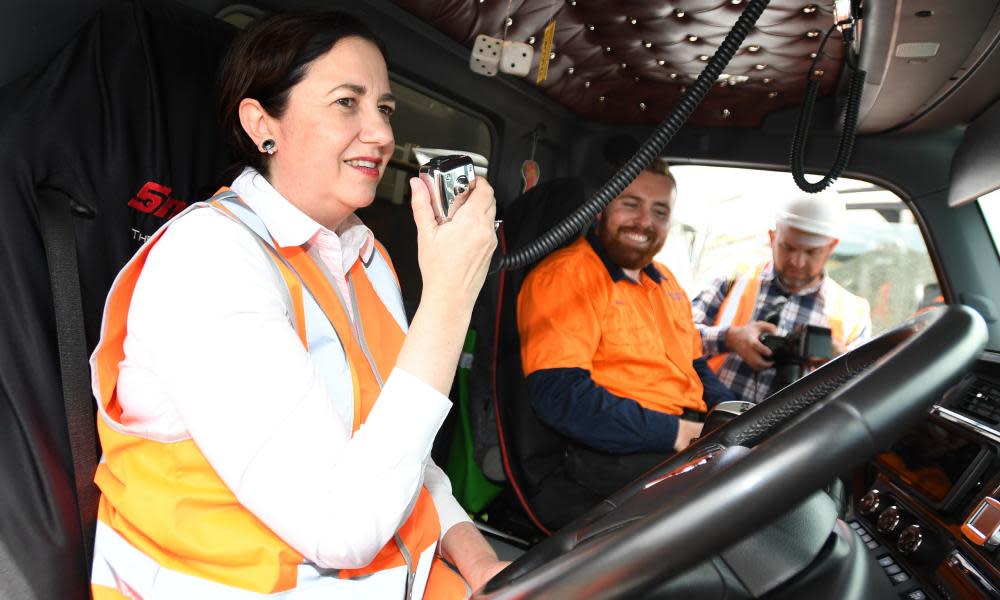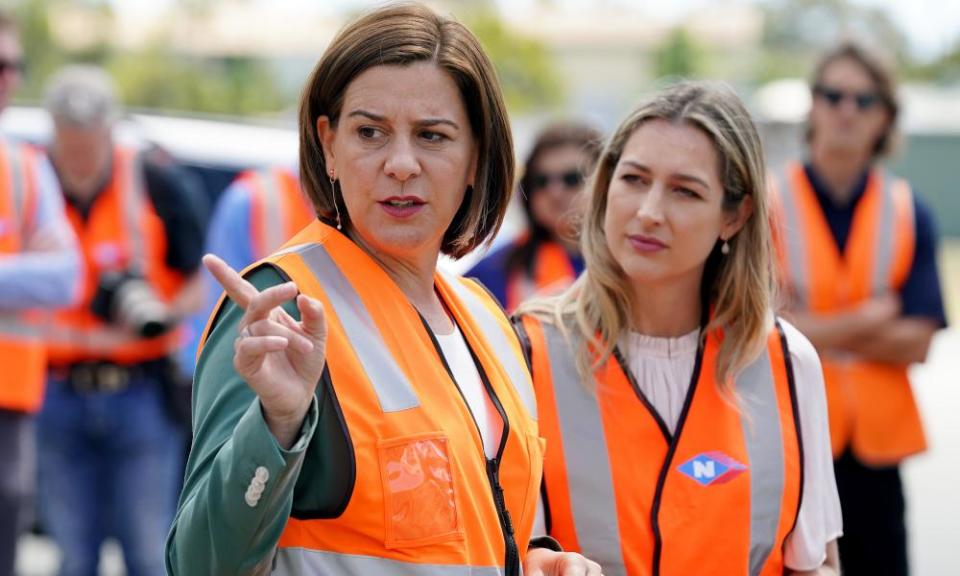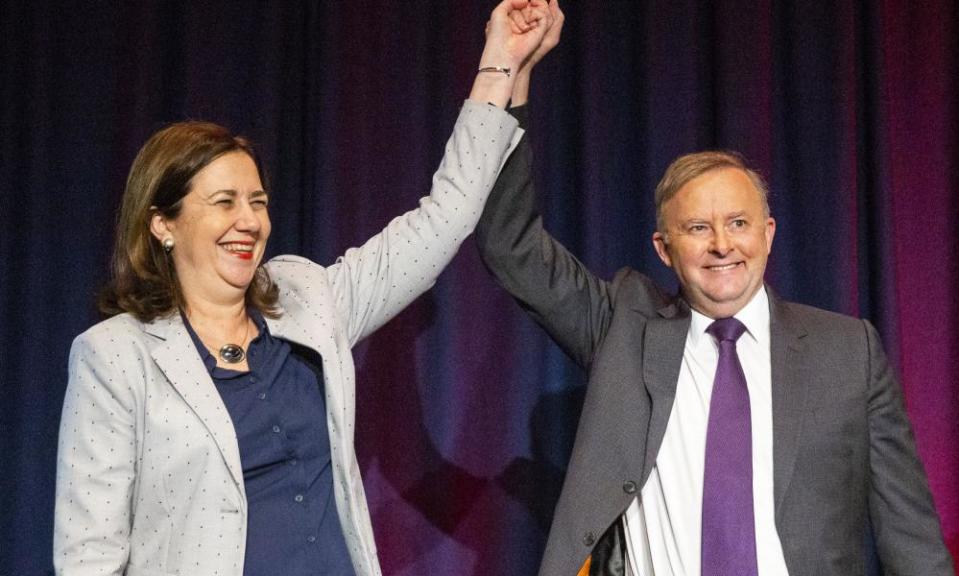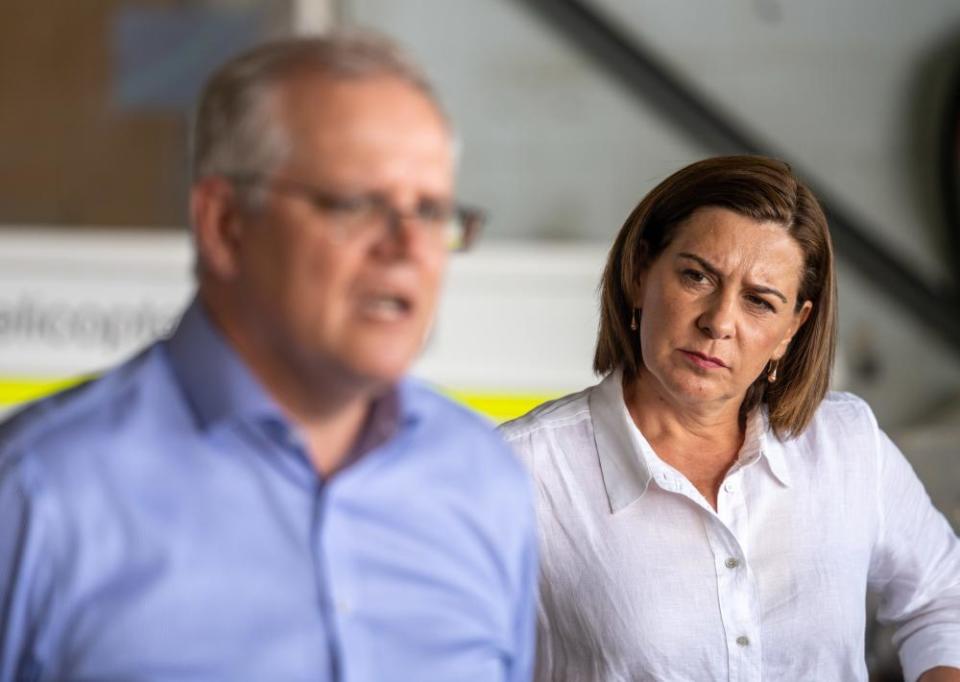Queensland election: has Palaszczuk helped defeat the politics of gender?

“Annastacia Palaszczuk is not the woman premier, she’s just the premier,” says Rachel Nolan, a former Queensland state minister.
“That’s the bridge that she has crossed. Palaszczuk’s great contribution has been to normalise the presence of women’s leadership.
“And that’s a really big deal.”
On 31 October, Palaszczuk and her Labor government will seek a third term in Queensland. For the first time in any Australian state, both major political parties will be led to an election by women.
Among all the usual focus on election minutiae, the historic nature of the contest between two women – Palaszczuk and the Liberal National party leader, Deb Frecklington – has barely rated a mention throughout the campaign. More column inches have been devoted to the return of election day sausage sizzles than discussion about gender.
More column inches have been devoted to the return of election day sausage sizzles than discussion about gender.
To Nolan, now the Queensland chair of the public policy thinktank the McKell Institute, the campaign represents a significant marker in the political discourse.
Nolan was the state’s youngest ever female MP and worked alongside Palaszczuk when they were both ministers under Queensland’s first female premier, Anna Bligh.
“In the Bligh government, partly because Anna was the first woman to be premier, because she represented a different style of leadership and because she was very progressive, the politics of gender was inescapable,” Nolan said.
“Whereas it’s much less of a live issue around Annastacia Palaszczuk as premier. I think that’s her great contribution in a way, that this is not such a big deal. That’s partly because it’s easier to be the second than to be the first. It’s also because she’s a very stable and reliable and indeed a quite cautious type of leader.
“I think that what people see when they look at Stacia is not ‘oh look, there’s a woman, isn’t that interesting and different’, it’s ‘there’s the premier and she’s rock solid’.
‘It felt like a fresh start’
On her Facebook profile, Frecklington describes herself as a “wife, mum and leader of the LNP”.
Frecklington is a qualified lawyer and a businesswoman who has worked mainly in the agricultural sector. She represents the seat of Nanango – centred on Kingaroy and its surrounds – the same held by the former premier Joh Bjelke-Petersen.
As a relatively moderate rural MP – in her maiden speech to parliament she warned about the “over-simplistic solutions of the far right” – Frecklington’s leadership threatened the least animosity in a party that has become increasingly fractured by competing factions. Six of the LNP’s 38 Queensland MPs are women.
“Of course I am more than happy to be put up there as a role model for any female, she told the Courier-Mail after becoming opposition leader in 2017.

“Prior to this I was a lawyer and that’s a man’s world as well, supposedly. So I just think women, like men, can get there on their merits.
“And I just think that while we need to provide opportunities to make sure that we do push women forward ... I think we have got to be careful not to play on it. Strong women like to stand on their own two feet.’’
MPs have told Guardian Australia one of the arguments for installing Frecklington in 2017 was the need for a new plan of attack against Labor.
“[2017 leader] Tim Nicholls felt like he was running into brick walls against Palaszczuk,” one MP said. “It wasn’t the only reason because people did really support Deb, but absolutely we thought having a female leader would change the dynamic in our favour.
“We had lost all but one election since the 1980s, it felt like a fresh start for the party.”
Polling has, however, consistently shown Frecklington has failed to cut through against Palaszczuk in terms of public approval and preferred premier. Earlier this year, similar polling was leaked earlier this year when backroom LNP figures engineered a botched attempt to replace Frecklington.
The accidental premier
After the 2012 election, Palaszczuk became known as “Snow White”, leading an opposition team of seven MPs.
Three years later, when she unexpectedly led Labor’s rump back to government in a single term, Palaszczuk became “the accidental premier”. Now she is the focal point of all the party’s state campaigning; tapping into an enormous social media following that has grown during the pandemic.
Labor sources say the premier’s social media engagement, particularly with mothers and women voters, has been “off the charts”.
“She just taps into that dining room table sort of sentiment. It’s a priceless attribute,” one Labor MP said.

Nolan says: “There’s no ego stories around her because she’s pretty focused on the punters themselves. It’s as if she’s seen as a normal person.”
Earlier this year, Frecklington gave a widely criticised interview with the Sunday Mail, in which she said Palaszczuk had “deliberately changed her image – the whole ‘Princess Palaszczuk’ is pretty obvious – but I haven’t changed mine”.
“I have no choice but to remain grounded, because of [my husband] Jason and the girls,” Frecklington said.
“I can have a tough day but then I’ll get a call from one of my kids and you’ve got to deal with whatever’s going on in their lives. She, on the other hand, has had a complete makeover – all the makeup, the designer labels, it’s too much, when there are bigger issues to focus on.”
Palaszczuk has spoken openly about having had a miscarriage, unsuccessful attempts to have a child through IVF and her painful history of endometriosis, which can affect fertility.
Mary Crawford, a former federal MP and a sessional academic in gender and politics at the Queensland University of Technology, said people were “dismayed” by the comments.
“I think there was quite a lot of backlash from other Liberal women and certainly ex-Liberal MPs,” Crawford said.
“One of the things that is a constant when you’re a woman is people are always worrying about what you’re wearing. The research bears this out, women are constantly being tested about their appearance.
“When a female leader starts doing that to another female leader there was quite a bit of anguish. There was some disquiet that she had fallen into that trap.”
Frecklington said critics of her comments sought to twist her words “for some warped political gain”.
Fewer negative attacks
The longer-term fallout from those comments – and the significant negative reaction – has posed problems for the framing of the LNP’s election campaign.
The party has run barely any negative advertising. Those few attacks have been directed at the deputy premier, Steven Miles, and the former deputy, Jackie Trad, rather than Palaszczuk.
On the eve of the election campaign, the LNP tried another approach – using male federal surrogates including the prime minister, Scott Morrison, and the Queensland-based home affairs minister, Peter Dutton – to launch personal attacks at the premier.
By focusing on cases of emotional hardship related to the coronavirus border closures, opponents quickly piled on to portray Palaszczuk as “heartless”.
Blair Williams, an associate lecturer at the Australian National University, whose research focuses on female politicians and their experiences of gendered and misogynistic media representations, says female leaders in particular are expected to demonstrate strength alongside compassion.

“Compassion is becoming a leadership trait that is needed and expected by leaders no matter their gender,” Williams said.
“But when you critique Dan Andrews’s compassion for instance, it’s not as damaging for him as it would be for a woman.
“Men are able to play the attack dog, but that’s just not available for women. Women can go into attack dog mode, but they also run the risk of being seen as cold and bitchy.”
Nolan said the criticisms of Palaszczuk’s border measures were “a very gendered sort of attack”.
“I thought it really clanged. It just was too hard, it was too vicious, it was too gendered and they stopped. I think they were testing a message for the election campaign, they gave it a red hot go and they just dropped it like a stone.
“I don’t think that Queenslanders see her leadership through a gendered lens.”
‘That is great change’
Soon after Labor was elected in 2015, Palaszczuk banned ministers from attending the Tattersall’s Club in Brisbane, a traditional haunt of the political class in Queensland, because the club only allowed male members.
The club has since changed its policy after public pressure, partly brought about by the government’s stance.
“When I was in government if we’d boycotted Tatt’s it would have been huge deal,” Nolan said.
Bligh has spoken about how she was reluctant to take a stand on gender issues.
“I thought that if I talked about sexism I would be seen as someone who can’t stand the heat,” Bligh told a lunch in 2014.
“I felt the expectations of my gender on my shoulders … my ups and downs would be used as a judgment on an entire gender.”
Palaszczuk has been different, without seeking to frame herself as a female premier.
“Twenty years ago I’d walk into a room in government and there’d be all men sitting around the table,” she told an International Women’s Day breakfast in Brisbane earlier this year.
“I walk into rooms now and I might have three or four of my ministers – because we have 50% women in our cabinet – and we can have a meeting where it is entirely women. And I sit back sometimes and I think ‘that is great change’.”

 Yahoo News
Yahoo News 
